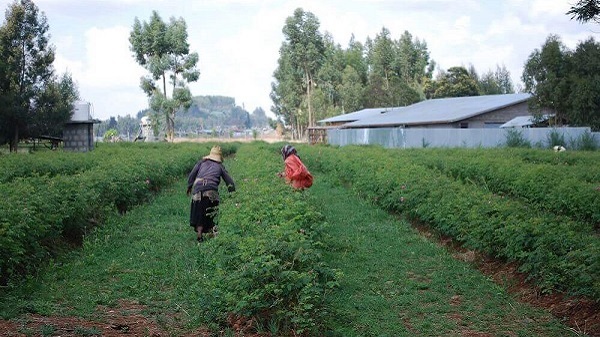
(WALA Heilmittel GmbH)–When it comes to sources of essential rose oil, countries such as Turkey, Bulgaria, Iran and Afghanistan come to mind – but Ethiopia? As it turns out, the Ethiopian highlands, which are known for their coffee, provide the ideal conditions for growing the very fragrant Damask rose, and this “Rosa damascena” yields an exceptionally precious essential oil.
In 2005, Ethiopian farmer Fekade Lakew joined forces with WALA Heilmittel GmbH and began cultivating Damask roses on six hectares of land in keeping with the principles of biodynamic agriculture. He has now expanded his land area to 25 hectares. In 2012, he distilled the first batch of essential rose oil. This is the first rose oil production in sub-Saharan Africa that is transitioning to organic standards. In line with its high quality standards and related commitment to only use raw materials obtained from biodynamic or controlled organic cultivation wherever possible, WALA, manufacturer of WALA Medicines and Dr. Hauschka Skin Care, believes that it is extremely important to establish new raw material partnerships.
The rose farm Terra PLC is located in Debre Berhan, some 125 kilometers north of Ethiopia’s capital city, Addis Ababa, at an altitude of 2900 meters. This high mountainous landscape is ideal for growing Damask roses. Everything began at the farm in 2002, when vegetables were planted there. After that came a brief phase of cultivating cut roses, but they did not tolerate the late frosts which can occur in the Ethiopian highlands. Fekade Lakew therefore decided to cultivate the more robust Damask roses.
He was soon in contact with WALA Heilmittel GmbH, which showed great interest in his efforts. “We had long been considering an attempt at growing roses near the Equator,” said Ralf Kunert, Managing Director of Naturamus GmbH. The prospects are especially promising because the closer plants grow to the Equator, the longer they blossom. In the countries known for cultivating roses such as Bulgaria, Turkey and Iran roses bloom within four weeks and have to be harvested in this time, whereas it takes eight weeks in Debre Berhan. “This is a huge advantage,” Ralf Kunert explains. “It means that we have twice the amount of time to harvest the same amount of rose blossoms.” In other words, there is less pressure on the farmers to finish the harvest quickly; fewer rose pickers are needed, and what’s more, they can be often be employed beyond the season itself. Furthermore, the quality of the roses can be monitored more closely during picking, and the output of the distillation unit is more consistent. Last but not least, Ethiopian highland roses offer yet another benefit: at four grams per blossom, they are nearly twice as heavy as the rose blossoms from other countries, which typically weigh 2 – 2.5 grams.
WALA Heilmittel GmbH accepts social responsibility
WALA provided motivation for the project by donating the rose cuttings. After nine years’ time, the plants had turned into hearty rose bushes. To make sure that the roses received the proper care from the very beginning and to create the best possible conditions, WALA provided Fekade Lakew and his employees a consultant in the field of biodynamic agriculture. The expert visits the rose farm at regular intervals several times a year to train and advise employees there about how to cultivate roses properly. As a means of ensuring compliance with the high standards WALA fundamentally upholds for the raw materials it processes, the first certification audit was held in 2012 in keeping with Demeter guidelines and the fair-trade standard “fair for life.” WALA financed the costs of the audit. A distillation unit was also installed in 2012. It was made in Ethiopia under the guidance of a Bulgarian distillery builder whom WALA had recommended. Funding came from WALA and the German aid organisation Gesellschaft für Internationale Zusammenarbeit (GIZ) , which was acting under contract with the German Federal Ministry for Economic Cooperation and Development (BMZ). “It is important to us that knowledge is generated in the country itself and amongst our project partners. Helping people to help themselves is WALA’s maxim,” Ralf Kunert states.
The objective of every WALA raw-material project is to expand biological agriculture across the globe. Partners are supported on site with funding and technical expertise. WALA signs a contract to purchase the raw materials yielded by the project. This gives the project partners security in planning, and their employees can be paid their wages on a regular basis. In its supplier relations, WALA pays special attention to decent working conditions, fair wages, and conscientious and responsible use of environmental resources.
Source: Dr. Hauschka
